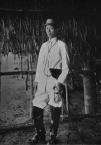Figure of Philippine History - A riddle
|
We look for a personality, which served a Philippine president and was also called the "dark rear room" of him. "X" -as we want to call him - yet gained importance within the Philippine independence movement. Some authors praise him as "hero and head of the independence movement". Other denotations like "pre-Marxian theorist of class struggle" (T. Friend) are rather erroneous. " After studying he becomes a freemason and member of the league Filipina. He earns a small income as teacher of the Latin language. When Philippine revolution breaks out, he is arrested by the Spaniards. But they release him very soon because they expect no danger from a paralytic man. After some time he is brought in a hammock to the leader of the Philippine revolution and later president, whom we want to call "Y". "Y" believes, when he saw the bad physical constitution of a person looked for, he would have made a mistake. What could a man in such a condition do to help him? But he was very quickly convinced of the qualifications of "X" and he became personal consultant of "Y". Now
our personality
is formulating decrees for "Y" and convinced
him, not to act as a dictator but as a president of a parliamentary democracy. "X" is engaged in a reform of province and
municipal councils. Division of political power is essential for him in favor of democracy. But when he argues that the rights of
Now the United States of America are entering the history of the Philippines. The Spanish-America war opens for a short moment the possibility of becoming free and independent. But independency remains only a dream. It comes to belligerent struggles and fights. The Philippines have to lament several hundred thousands of war dead people. "X" attempts to end the belligerent struggles on the way of negotiations. However, the negotiations fail because the Americans insist on a one-sided power renunciation of the Filipinos. "X" than requests the Filipinos for the continuation of the bitter fight. "Even if the struggles were futile, so that the future generation, whiule praying on our tombs, want bitterly grant us tears of love and gratitude." The military predominance of the Americans however weakened the front of the Filipinos. Now there are more and more Filipinos wishing an autonomy of the Philippines under American dominance and the "Americanistas" want to get a state within the USA. "X" remains engaged in favor of independency of the Philippines. But he is loosing the support of congress and has to give up his position as member of cabinet. "X" is now destitute and is looking for physical regeneration at different places and he is escaping from the Americans which proclaimed the martial law. He is seized by intrigues and brought to a military prison in Manila. There he got an opportunity to have a conversation with the American commander-in-chief. (His son will later liberate the Philippines from the Japanese military rule in 1945.) However "X" refuses the oath of obedience. The "stubborn, uncorrectable nationalist" is deported to the pacific island of Guam and he is spending more than two years there. Later he is getting the possibility to board an American war ship and he is meeting in the port of Manila former political friends. The conversations show him that the resistance of the Philippines collapsed. Like his president he is now rendering the oath of allegiance. "X" retires to his modest house to Nagtahan. Now he has only a short time to live. A cholera epidemic brings his life to an end at the age of 39 years. "Thus ended the life of a great leader, a man who made the best of himself and his talents in order that he might serve his God and his country" (M.Guzman). He got a solemn funeral ceremony.
Who was "X" and who "Y"?
|
 X" grew up in a small
barrio in Batangas as son of a poor farmer family and he is one of the few representatives of the
political elite, which took their way from the lower classes. It is said
that he was as child very shy und he avoided loud child's play. He got
excellent marks in school, which enabled him to enroll at St. Thomas
University. He rejected the wish of his mother to study theology and decided
in favor of law and philosophy. He believed that this decision could help
him to do more for the rights of poorer population. In age of 32 he fell ill
with polio and was paralyzed at the lower limbs since then.
X" grew up in a small
barrio in Batangas as son of a poor farmer family and he is one of the few representatives of the
political elite, which took their way from the lower classes. It is said
that he was as child very shy und he avoided loud child's play. He got
excellent marks in school, which enabled him to enroll at St. Thomas
University. He rejected the wish of his mother to study theology and decided
in favor of law and philosophy. He believed that this decision could help
him to do more for the rights of poorer population. In age of 32 he fell ill
with polio and was paralyzed at the lower limbs since then. executive should be strengthened he is getting a conflict with the congress which requests strong rights for the legislative power. But he remains in cabinet and becomes a secretary of state. Now he is engaged in favor of a legal divorce and a catholic church independent
of roman clergy.
executive should be strengthened he is getting a conflict with the congress which requests strong rights for the legislative power. But he remains in cabinet and becomes a secretary of state. Now he is engaged in favor of a legal divorce and a catholic church independent
of roman clergy.
